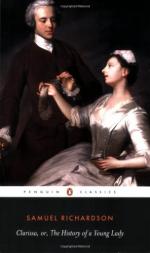I have ‘another reason’ (as I may tell to you, my ‘old school-fellow’) to make me wish for this ‘fine lady’s recovery’ and ‘health’; and that is, (by some distant intimations,) I have heard from Mr. John Harlowe, that it is ‘very likely’ (because of the ‘slur’ she hath received) that she will choose to ‘live privately’ and ’penitently’—and will probably (when she cometh into her ‘estate’) keep a ‘chaplain’ to direct her in her ‘devotions’ and ’penitence’—If she doth, who can stand a ‘better chance’ than ’myself’?—And as I find (by ‘your’ account, as well as by ’every body’s’) that she is innocent as to ‘intention,’ and is resolved never to think of Mr. ‘Lovelace more,’ who knoweth ‘what’ (in time) ‘may happen’? —And yet it must be after Mr. ‘Lovelace’s death,’ (which may possibly sooner happen than he ‘thinketh’ of, by means of his ’detestable courses’:) for, after all, a man who is of ‘public utility,’ ought not (for the ‘finest woman’ in the world) to lay his ‘throat’ at the ‘mercy’ of a man who boggleth at nothing.
I beseech you, let not this hint ‘go farther’ than to ‘yourself,’ your ‘spouse,’ and Mrs. ‘Barker.’ I know I may trust my ‘life’ in ’your hands’ and ‘theirs.’ There have been (let me tell ye) ‘unlikelier’ things come to pass, and that with ‘rich widows,’ (some of ‘quality’ truly!) whose choice, in their ‘first marriages’ hath (perhaps) been guided by ‘motives of convenience,’ or ‘mere corporalities,’ as I may say; but who by their ‘second’ have had for their view the ‘corporal’ and ‘spiritual’ mingled; which is the most eligible (no doubt) to ‘substance’ composed ‘of both,’ as ‘men’ and ‘women’ are.
Nor think (Sir) that, should such a thing come to pass, ‘either’ would be ‘disgraced,’ since ‘the lady’ in ‘me’ would marry a ‘gentleman’ and a ‘scholar’: and as to ‘mine own honour,’ as the ‘slur’ would bring her ‘high fortunes’ down to an ‘equivalence’ with my ‘mean ones,’ (if ‘fortune’ only, and not ‘merit,’ be considered,) so hath not the ‘life’ of ‘this lady’ been ‘so tainted,’ (either by ‘length of time,’ or ‘naughtiness of practice,’) as to put her on a ‘foot’ with the ’cast Abigails,’ that too, too often, (God knoweth,) are thought good enough for a ‘young clergyman,’ who, perhaps, is drawn in by a ‘poor benefice’; and (if the ‘wicked one’ be not ‘quite worn out’) groweth poorer and poorer upon it, by an ‘increase of family’ he knoweth not whether ’is most his,’ or his ‘noble,’ (’ignoble,’ I should say,) ‘patrons.’
But, all this ‘apart,’ and ‘in confidence.’
I know you made at school but a small progress in ‘languages.’ So I have restrained myself from ‘many illustrations’ from the ‘classics,’ that I could have filled this letter with, (as I have done the enclosed one:) and, being at a ‘distance,’ I cannot ‘explain’ them to you, as I ’do to my friend,’ Mr. John Harlowe; and who, (after all,) is obliged to ‘me’ for pointing out to ‘him’ many ‘beauties’ of the ‘authors I quote,’ which otherwise would lie concealed from ‘him,’ as they must from every ’common observer.’—But this (too) ’inter nos’—for he would not take it well to ‘have it known’—’Jays’ (you know, old school-fellow, ‘jays,’ you know) ‘will strut in peacocks’ feathers.’




